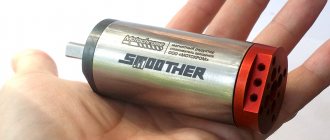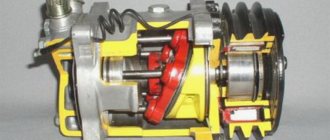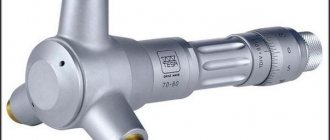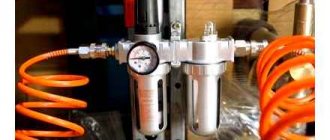Original German autobuffers Power Guard
Mirror-video recorder FUGICAR FC8
Sun blinds Trokot with magnets!!!
Compressor oil is a special type of fuel and lubricant, specially designed for use in moving components and assemblies of compressor equipment. There are several types of compressor oils, each having its own area of application and differing in operational and technical characteristics.
Description and features
In terms of their area of use and technical characteristics, compressor oils are classified as motor oils. They are operated under similar conditions - they are exposed to elevated temperatures and sudden changes in operating conditions.
Like other oils used to lubricate internal combustion engines, compressor lubricants are created on a mineral, synthetic or semi-synthetic basis.
The cost of fuels and lubricants depends on this - synthetics, which are more durable and have better performance properties, will accordingly cost the buyer more.
Another important technical indicator is the degree of viscosity, which determines the fluidity of the oil. The higher this indicator, the more easily the lubricant penetrates into the smallest gaps of moving parts inside the mechanism. The low viscosity coefficient of the oil facilitates the operation of the compressor unit, reducing friction and preventing the formation of harmful deposits in the gaps - soot, corrosion and oxides.
The peculiarity of using lubricants for compressors lies in their technical design.
The compressor operates like a conventional internal combustion engine, but in reverse mode. If in an internal combustion engine the torque from the piston group is transmitted to the crankshaft via the connecting rod shaft, then in compressors it is the other way around - from the crankshaft the torque goes to the piston group, which pumps air into the receiver or supplies it directly to the consumer. In the case of a car engine, oil that gets into the piston chamber will simply burn along with the fuel.
In a compressor, the lubricant that gets into the piston group will inevitably end up in the receiver chamber or in the environment into which the compressed air is supplied. Such contamination by fuel particles can lead to negative consequences, therefore special technical requirements are imposed on compressor oils.
Why do you need a compressor?
In order to supply compressed air or other gases under high pressure, devices are needed that help compress the gas entering them to small volumes. At the same time, they must be compact, small-sized and mobile. These devices are called compressors. Their use is very wide in various fields, for example, in car services and in the renovation of apartments, offices and building facades. The lightest and most compact devices are used in everyday life to perform various types of work around the house and in the garden.
Types of compressors.
For these purposes, you can use cheap oil-free compressors, but their service life is limited, since parts wear out very quickly without oil. For car services and companies performing repair or construction work, more reliable oil devices are suitable, but their price will be more expensive. But their use will last longer than those without the use of lubricant. In industrial conditions, compressors are installed with large dimensions and high power, using KS 19 oil to improve performance characteristics.
When using a compressor, it is very important that the electricity flows without interruption and there must be a constant voltage. For this purpose, it is better to purchase a stabilizer that keeps the current constant
Then the device will operate without interruption, and the wear of compressor parts will occur more slowly. The efficiency of a unit that uses oil lubrication is much higher than the efficiency of a device that does not have lubrication. Since oil-free appliances are unstable at high and low temperatures.
In the modern world, with the help of this device you can inflate car tires and any rubber products, paint a fence or walls, and do many other useful things. Since electricity is now very expensive, many manufacturers are thinking about how to make repairs cheaper than the cost of using electric tools. It turned out that tools powered by compressed air use much less energy, while their use is much easier in terms of labor costs.
Composition and performance characteristics
To ensure trouble-free operation and long service life of the mechanisms, the lubricant must meet the following requirements:
- Ensure temperature stability by effectively cooling the moving internal components of the compressor;
- Prevent the formation of coke-like deposits during oil heating;
- Have a stable viscosity indicator over a wide range of operating temperatures;
- Maintain the tightness of the joints of the parts, filling all the gaps;
- It is good to lubricate rubbing parts to avoid abrasion and overheating.
To achieve the above requirements, compressor oils have the following performance and technical characteristics:
- The viscosity coefficient at t = 100ºC varies in the range from 7 to 30 centistokes;
- Low degree of evaporation, including at elevated operating temperatures;
- Ability to perform its functions at high temperatures of mechanism components and pumped substances. According to the requirements of technical standards, the ignition temperature of compressor lubricant should be from 190 to 270ºC;
- Chemical neutrality. It must not react with the pumped gases. When used in refrigeration units, compressor oil must be inert towards refrigerants.
Based on their composition, compressor oils are divided into mineral-based varieties. These are either pure mineral oils or have a certain percentage of additives that provide anti-corrosion properties, oxidative stability, and increase the service life of fuels and lubricants.
In recent years, synthetic and semi-synthetic oils made from hydrotreated or essential oils have become widespread. Their main advantage compared to mineral oil is their improved technical characteristics. This concerns the fluidity rate, the lower solidification threshold, and the ability to work for a long time in particularly difficult conditions.
Compressor oil KS-19P
Chainsaw oil
PURPOSE AND DESCRIPTION OF KS-19P OIL
Oil KS-19P
Designed for lubrication of medium and high pressure piston compressors, blowers and rotary compressors used in various industries and transport, where the equipment manufacturer specifies the use of oil of this viscosity class. Also recommended for single-stage and multi-stage compressors compressing air and/or other oil-insoluble gases. The use of unique base oils ensures high performance characteristics of the product.
ADVANTAGES OF KS-19P OIL
contains an antioxidant additive that helps minimize the formation of oil deposits in compressor discharge lines
has good thermal stability, which guarantees long-term and efficient performance of the oil
high auto-ignition temperature ensures safe operation of compressors
oil acts as a sealing medium (seals the compression chamber), lubricates cylinders and valves, protects parts from corrosion
APPROVALS / CONFORMITY OF OIL KS-19P
TU 38.401-58-243-99.
PHYSICO-CHEMICAL CHARACTERISTICS OF KS-19P OIL
| Indicator name | Norm |
| Kinematic viscosity at 100C, mm2/s: | 24,1 |
| Viscosity index | 90 |
| Flash point in an open crucible, C | 260 |
| Pour point, C | -15 |
| Acid number, mg KOH/g | ots. |
| Ash content, % | 0,003 |
| Coking rate, % | 0,39 |
| Mass fraction of sulfur, % | 0,4 |
| Stability against oxidation: - sediment after oxidation, % wt. — acid number of oxidized oil, mg KOH/g | 0,002 0,2 |
| Density, at 20 C, g/cm3 | 0,894 |
| Color on the CNT colorimeter, units. CST | 4,0 |
Produced by OJSC Gazpromneft-ONPZ, 644040, Russia, Omsk, Gubkin Ave., 1 according to TU 38.401-58-243-99 Produced by order of LLC Gazpromneft-SM OJSC Slavneft-YANOS, 150023, Russia, Yaroslavl, Moskovsky Avenue, 130, according to TU 38.401-58-243-99. The above data is typical of the product obtained within normal manufacturing tolerances and does not constitute specifications. The information is for reference only and is subject to change without notice.
Standard packaging: 216.5 l barrels.
Product status: permanent stock item Availability in warehouse: yes Quantity: >> 52
Call | Request a call back | write us a letter
Classification of compressor oils and their scope
All modern compressors are divided into two main types, differing in their design and operating features. These include:
- Volumetric. In such equipment, the distilled gaseous substance is sucked into the working chamber, compressed and thrown out under pressure by the forward-return movement of the piston system;
- Dynamic. The compression of the medium they distill is carried out using turbine mechanisms. The intake gas is accelerated by the turbine rotors, after which it suddenly slows down, causing it to be dynamically compressed.
In volumetric piston compressors, oil provides lubrication of moving parts - piston group, valves, bearings. Traditionally, such models use mineral oil that meets international certificates DIN-51506-VGL, VDL. The viscosity class for them corresponds to ISO/VG standards from 68 to 150. In positive displacement rotary or screw compressors, the moving parts are lubricated using an oil bath. As a result, the oil is constantly mixed with the forced air, heating to a temperature of about 90-100ºC.
At the outlet of the compressor chamber, a filter device is installed that separates the oil from the gaseous substance. Therefore, for use in rotary and screw compressors, oils with increased deaeration and demulsification characteristics are used.
Special requirements are also imposed on increased anti-corrosion properties and the maximum amount of deposits during operation. Most manufacturers of such equipment provide instructions in the accompanying instructions regarding the selection of a suitable lubricant.
In dynamic modifications of compressor units, lubrication is provided through a forced supply circuit: gears, shaft seals, bearings. It is recommended to use the same type of oil for the compressor operating mechanism and its drive system. It is recommended to use special turbine oils of the following grades in dynamic installations that comply with the ISO/DP-6521 standard:
- DIN-51-515 TDL-32;
- TDL-46;
- TDL-68;
- TDL-EP with extreme pressure additives.
Conventional motor oils are classified according to their flash point.
Compressor lubricants are divided, unlike motor lubricants, according to the temperature of the pumped substance.
In Russia, along with the international classification of compressor oils, the domestic classification adopted by Gostekhnadzor back in Soviet times is still often used.
According to it, all compressor oils are divided into 4 groups:
- Lubricant intended for operation under moderate loads. The temperature of the discharge gas does not exceed 160ºC.
- The second group is intended for operation under moderate loads, but with a discharge gas temperature of up to 180 degrees.
- Compressor lubricant of the third group is designed for mechanisms operating under increased loads and temperatures up to 200ºC.
- The last group includes oils intended for operation in extremely difficult conditions, with increased pressure and temperatures up to 200ºC.
Each group has a special list of operational and technical properties that must be taken into account when choosing the type of oil for the compressor.
It should be noted that foreign manufacturers have not developed a unified classification for operating temperature, and each large company uses its own standards.
Synthetic or mineral?
Compressor oil, like any other oil, is a subject of debate where there is no consensus. Some prefer mineral, others prefer synthetic. Mineral oil is cheaper and is mainly used in cases where the compressor is not used often. However, there is one limitation - the operating temperature should not exceed +90 °C. Otherwise, fire or detonation may occur. It should also be noted that mineral water has a low service life - only 2-4 thousand hours, depending on the brand and manufacturer.
Synthetic compressor oil differs in properties. It allows operating temperatures up to +180...+200 °C, without disturbing its structure and without leading to detonation. Also, synthetics work great at low temperatures, so they can be used even outside in winter. The service life of synthetic oil is 2-4 times longer than that of universal oil (up to 8000 hours). It is most advisable to use such materials if the compressor is used actively and frequently.
Instructions for use
In order for compressor oil to provide effective protection of the mechanism, you must follow the main rules for its use:
- To select the correct class and type of oil, you must carefully read the technical instructions before filling. Manufacturers of compressor equipment always indicate the recommended lubricant in the specification;
- When filling, half of the required volume of lubricant is poured directly into the compressor mechanism, and the second half into the oil tank (receiver). In this case, the oil will be evenly distributed throughout the entire volume of the mechanism, ensuring the most complete filling of the gaps between the rubbing parts;
- When starting a compressor with freshly filled oil, there is a high probability of water hammer occurring, which can damage internal components and parts of the equipment. To avoid this problem, it is necessary to rotate the shaft manually several times to evenly distribute the lubricant;
- After filling, do not immediately turn on the compressor. It is necessary to wait about an hour, allowing the compressor oil to settle and fill all internal gaps;
- The oil must be changed in accordance with the manufacturer's technical recommendations, after a certain number of operating hours. If the operating hours during operation of the compressor are not calculated, then the optimal option would be the oil change range - twice a year.
Correct use of oils will increase the service life of compressor equipment, reducing wear of its units and components.
It is prohibited to mix different types of oil when filling, and when changing oil, the oil system of the mechanism must be flushed.
Production
The use of a synthetic base for the manufacture of KS-19 is excluded by GOST requirements.
During processing by hydrotreating, sulfur content is reduced simultaneously with the proportion of oxygen-containing compounds, which provides the lubricant with minimal oxidation.
The base is brought to the required viscosity, then the required minimum of additives is added. Let's summarize
KS-19 oil has the required kinematic viscosity, high temperature stability with a low degree of self-ignition. It has a number of advantages, which are confirmed both by tests and by the experience of users of compressor devices - domestic and industrial.
What makes the lubricant accessible to all categories of consumers is not only the optimal price, but also the variety of liquid pouring options.
It is possible to replace KS-19 with MS-20 oil.
Specialists in the supply departments of enterprises are offered draft KS-19 in any required quantities. And for everyday use, the oil is sold in cans and bottles of various sizes, which gives convenience and freedom of choice.
DVR NEOLINE X-COP 9100S
Fugicar FC8 mirror-on-board computer
Black Size – gel for penis enlargement
Previous
Compressor oil KS-19
Advantages
Compressor oils differ from conventional motor oils in a number of advantages that allow them to be used in particularly difficult conditions.
- Compressor lubricant has a high degree of resistance to aging. During operation, when interacting with air and under the influence of high temperatures, a relatively small amount of coke-like residues is formed in them;
- The additives used in their composition increase their anti-corrosion properties and ability to resist oxidation;
- Due to their high fluidity coefficient, compressor oils are able to lubricate the smallest gaps between contacting parts. This achieves a reduction in friction and increases the wear resistance of compressor equipment parts.
- Ability to work at elevated ambient temperatures reaching 200ºC.











